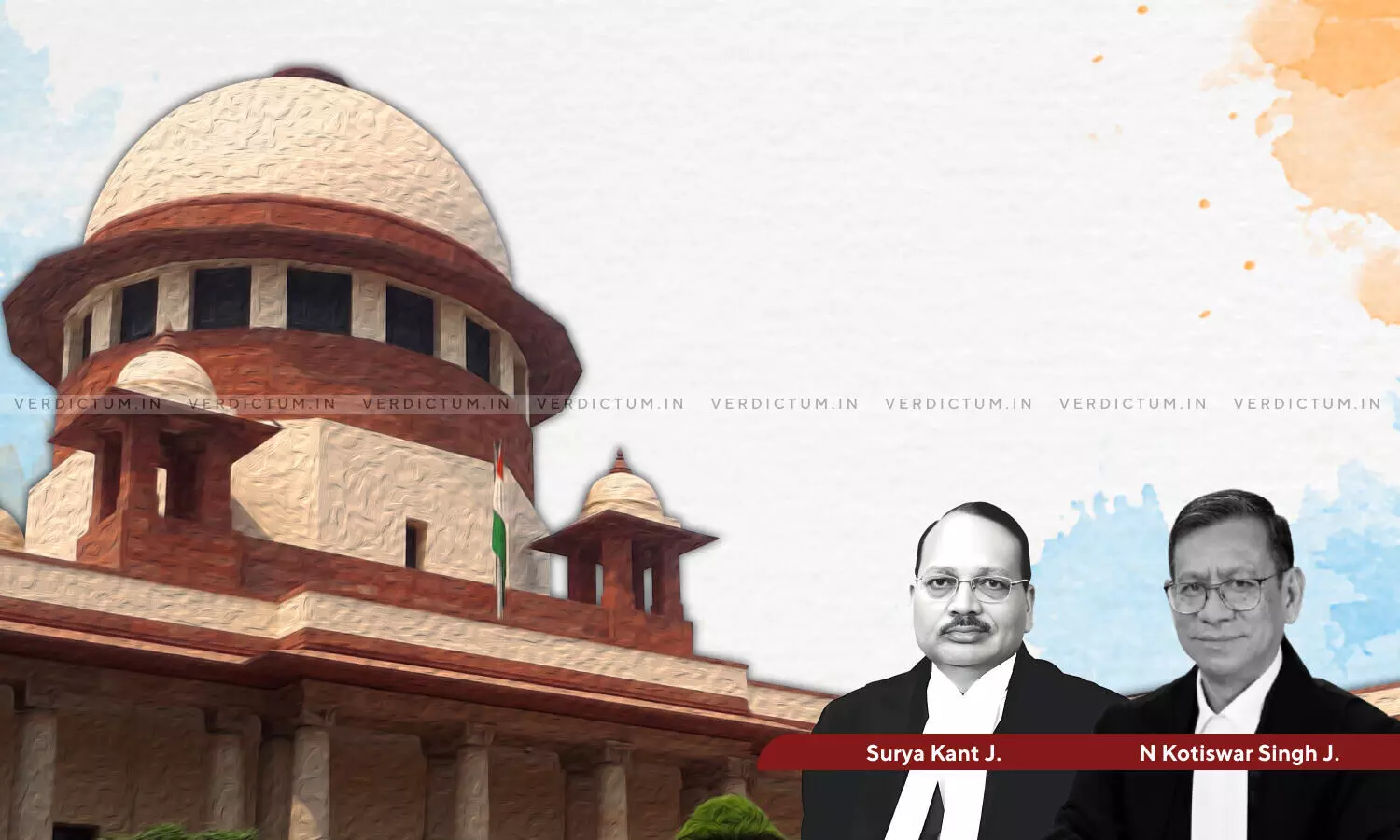
Justice Surya Kant, Justice Nongmeikapam Kotiswar Singh, Supreme Court
Pahalgam Terror Attack| Supreme Court Directs Authorities Not To Deport Family After Centre Agrees To Verify Documents
 |
|The Supreme Court today directed the Central Government authorities not to take any coercive action, including deportation, against six individuals who claim to be Indian nationals, until an appropriate decision is taken by the authorities after verification of their documents.
However, the Bench clarified that the order has been passed in light of the peculiar facts of the case and should not be treated as a precedent.
A Bench of Justice Surya Kant and Justice N. Kotiswar Singh remarked, “Since the factual claims made by the petitioners require verification by the authorities, including the genuineness or validity of the documents appended with this petition, we dispose of the matter at this stage without expressing any opinion on merit.”
The plea under Article 32 sought urgent relief for six family members, claiming they were “at the threshold of being thrown out of the country.” Petitioners submitted that they were detained and taken to the Wagah border for deportation, despite holding Indian passports, Aadhaar, PAN and Voter ID cards.
Counsel told the Court, “Kindly protect our liberty and life… the family was taken in a jeep to the Wagah border… Even though we are Indian nationals.” It was submitted that Petitioners 1 and 6 are working in Bengaluru, while Petitioners 2, 3, 4 and 5 — the parents and two children — live in Srinagar. “We have ancestral property in Srinagar also,” the counsel added.
However, the Court questioned the lack of clarity in the petition. Justice Surya Kant asked, “So how did Petitioner No. 1 come to India? First of all, you tell us.” Counsel initially replied that Petitioner No. 1 came using an Indian passport but then corrected himself, “No, Pakistani passport. He surrendered the passport at the border.”
The Bench said, “These are basic things you should have mentioned in the petition.” It further questioned, “Which country issued the passport? Was any visa granted at the border?” To this, the petitioner replied, “My father came from the Zafarabad side of Kashmir, not exactly Pakistan. In 1997, he had a Pakistani passport because he was required to travel from that side to this side.”
The Court noted contradictions and stated, “That is the whole problem. Now all contradictory averments are being made… Who drafted this petition?” Counsel said it was drafted by a colleague on instructions, he added, “But my humble submission is, the passport issued to me by the Government of India has not been revoked. Admittedly, there is no enquiry against its revocation.”
Solicitor General Tushar Mehta submitted, “Let them approach the authorities. All these things need to be verified. Otherwise, this may become a template.” He also said, “If I am a Pakistani national, and I overstay a visa…there’s a judgment that says once you overstay, you're no longer entitled to stay.”
When the petitioner said, “I am an Indian national with an Indian passport,” Mehta responded, “You are not a citizen...”
The Court also questioned why the petitioners had approached the Supreme Court directly. “Why have you not gone to the High Court? The only authority who can verify the documents and facts is in Srinagar. Other similarly placed persons have gone to the High Court and received some relief … we saw it in the newspaper yesterday.”
Counsel replied, “It was imminent, My Lords. There was no time.” The Court responded, “You are only seeking relief against authorities located in Srinagar. If you are dissatisfied with the decision, you may approach the Jammu & Kashmir High Court.”
The Court then dictated, “Petitioner Nos. 2 and 3 are husband and wife; Petitioners 1, 4, 5, and 6 are their children. Some of the petitioners are currently residents of Srinagar, while others are in Bangalore.” It noted that the Government of India had revoked visas issued to Pakistani nationals except where protected, while the petitioners relied on Indian documents.
“Since the factual claims made by the petitioners require verification… we dispose of the matter at this stage without expressing any opinion on merit, with a direction to the respondent authorities to verify the documents and facts and take an appropriate decision. No coercive action, including deportation, shall be taken in the meantime.”
The Court concluded, “This order has been passed in view of the peculiar facts and circumstances of this case and shall not be treated as a precedent.”
Cause Title: Ahmed Tarek Butt v. Union of India ( Diary No. 23301 of 2025)